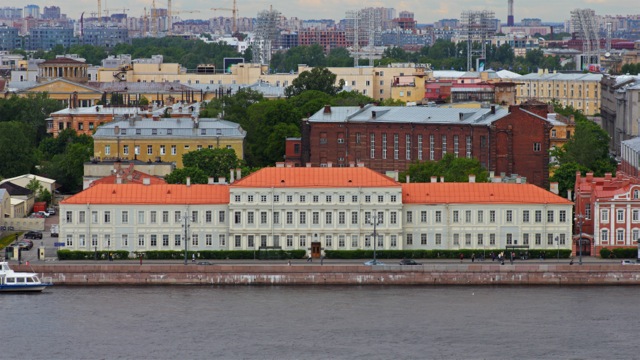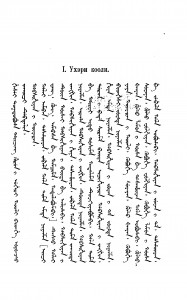A Hard-won Work: A. O. Ivanovskii’s Manchzhurskaia khrestomatiia
Gregory Afinogenov, Harvard University
Aleksei Osipovich Ivanovskii’s academic career was not exactly an unqualified success. In1885, at the age of 22, he had just finished his undergraduate thesis when his alma mater—St. Petersburg University’s Oriental Faculty, Russia’s flagship institution for all things Sinological—appointed him to teach its Manchu courses. The venerable I. I. Zakharov, author of one of the finest Manchu grammars, had just died, and nobody else was willing to teach them. Two years later, Ivanovskii had barely finished his master’s thesis on the ethnic minorities of Yunnan when he came up for an extraordinary professorship. His colleagues began lobbying against him. The Mongolist A. M. Pozdneev was particularly opposed: “Ivanovskii’s work and personality don’t inspire a lot of sympathy, especially from a bystander … We know that the publications of young people are in essence utterly without significance, and therefore it’s possible that Ivanovskii too might have more extensive knowledge than expressed in the dissertation, but on the other hand, how can we reject the doubts these dissertations provoke?” Pozdneev was especially incensed that Ivanovskii had never been to China “and therefore had the most inadequate idea of the country and of the language of its inhabitants.”
[1]
Still, the fact remained that no one else was willing to take up the task. Worse still, in 1893 the brilliant S. M. Georgievskii died and left Ivanovskii with the task of teaching Manchu and Chinese at the same time, so that he sometimes had to give thirteen lectures in a single week. As another colleague, V. M. Alekseev, recalled, “He literally became enfeebled under the unbearable burden of the gigantic Chinese literature course, he was gravely ill and suffered from alcoholism. He was poor and often complained of being unable to buy the needed books.” After leaving the university because of an “incurable mental illness,” Ivanovskii died in 1903. He was 40 years old.[2]
Despite his teaching load, however, Ivanovskii left his Manjurist successors with a number of interesting academic works. Most of them were produced based on materials he gathered on his one trip to China; they led to articles on Solon and Daur languages, Manchurian theater, and more. His most lasting work, however, was Man’chzhurskaia khrestomatiia (A Manchu Chrestomathy, published in 1893, with an expanded edition in 1895; not to be confused with an 1863 book of the same name). This text is of interest even to scholars who don’t know Russian—and better yet, it is available in PDF form. The book lacks a preface or any description of how its contents were compiled, but it does have a table of contents, which are translated from the Russian below. (The third and fourth pages before page 1 contain a list of Manchu typos, indicated by page and line number; the numbering of the contents is odd, but clear.)
- A. First issue: Texts, printed in Manchu font.
A.
Preface [appears to be absent], p.1
III.Chinese text of the first prayer, p. 119
IV. Letter of Beile Shang-shan to Wu Sangui, p. 41
- V. Posthumous edict of the Jiajing emperor on the appointment of a successor, p. 51;
V.Chinese text, p. 0075
VI.Baicaha babe tucibume gisurehengge, p. 56
- VII. Samples of bureaucratic documents, p. 83
- VIII. Samples of personal letters, p. 99
IX.Songs, p. 107
IX.
- A. Second issue: Texts set in the Russian linguistic alphabet.
A.
- a. Transcribed texts
- I. Han i banjibuha sing li jin i bithe, sunjaci debtelin. Booi dorolon, p. 123;
I.Chinese text, p. 0001
- II. Wargi ba be toktobuha ejebun, p. 164;
II.Chinese text, p. 0051.
III. Dorolon i nomun, orin nadaci debtelin, p. 168;
III.Dorolon i nomun, orin uyuci debtelin, p. 173;
III.Chinese text, p. 0059, 0069
IV.Stories from the Liaozhai zhiyi, p. 176;
IV.Chinese text, p. 0080
IV.
- b. Texts, recorded by V. V. Radlov according to pronunciation
- I. Ucun – Songs, p. 189
- II. A Kirgiz folktale, p. 193
III. A story about the Kangxi emperor, p. 211
Appendix
- I. List of Chinese bureaucratic institutions and titles, p. 213
- II. Provincial administration, p. 228
- III. Chinese ranks by class, p. 234
- Civil ranks by class, p. 234
- Military ranks by class, p. 239
- IV. Index of Chinese and Manchu names in the appendix, p. 242
- Index of Chinese words, p. 242
- Index of Manchu words, p. 248
Addendum to p. 236-239, p. 255
[1] Qtd. in P. E. Skachkov, Ocherki istorii russkogo kitaevedenii︠a︡ (Moskva: Nauka, 1977), 234.
[2] Skachkov, Ocherki istorii russkogo kitaevedenii︠a︡, 235; V. V. Bartolʹd, Sochinenii︠a︡ (Moskva: Izd-vo vostochnoĭ lit-ry, 1963), IX:180.
p. 255


